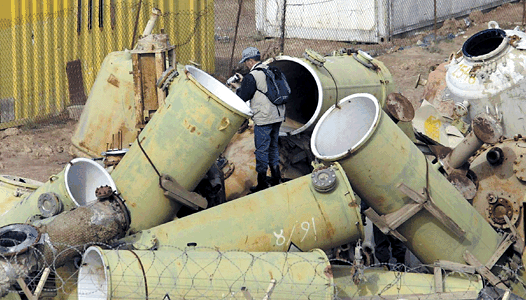U.S. and Russia Agree to Remove Syrian Chemical Weapons
September 16, 2013
The United States and Russia agreed on September 14 on the framework for a plan to secure and destroy Syria’s stock of chemical weapons by mid-2014. The deal puts on hold the threat of a U.S. military strike against Syria for allegedly using chemical agents in an attack on Aug. 21, 2013, that left more than 1,400 Syrians dead, including hundreds of children.
This morning, the authors of a United Nations (UN) report on the chemical attack in Syria wrote that inspectors had found “clear and convincing evidence that surface to surface rockets containing the nerve gas sarin” were launched into suburbs around Damascus, the Syrian capital. However, the report stopped short of assigning blame for the attack. The United States has accused the regime of Syrian President Bashar al-Assad of carrying out the attack. Syria and its close ally Russia contend that rebel forces fighting to overthrow Assad were responsible.
The deal brokered by U.S. Secretary of State John Kerry and Russian Foreign Minister Sergei Lavrov specifies that Syria has until September 21 to submit a “comprehensive listing, including names, types, and quantities of its chemical weapons agents . . .” Among other provisions, Syria must also give UN inspectors, scheduled to be on the ground by November, “immediate and unfettered” access to all chemical weapons storage, production, research, and development sites.
A United Nations inspector examines dismantled equipment used during the 1980′s and 1990′s in Iraq’s chemical weapons program. (Reuters/Getty Images)
The final agreement needs to be backed by a resolution by the UN Security Council, which must approve any action against Syria if it fails to comply with the agreement. However, two of the five members of the council–Russia and China–have consistently opposed any efforts to impose sanctions on Syria for the brutality rained down on Syria’s civilians during the current civil war.
International affairs experts note the implementation of the agreement faces many challenges. Syria has not yet signed off on it. In addition, Russia and the United States have not agreed on the amount and location of Syria’s chemical stockpile. Moreover, the already difficult task of destroying the weapons will be greatly complicated by the country’s ongoing civil war. And no operation of this extent has ever been carried out by the Organization for the Prohibition of Chemical Weapons, which would have technical authority over the process.
In a nationally televised address last week, President Barack Obama argued that the United States has a moral obligation to consider a military strike against Syria for the alleged chemical attack. “Our ideals and principles, as well as our national security, are at stake in Syria,” the president declared.
Additional World Book articles:
- Arab Spring
- The Middle East: From Fall to Spring (a special report)
- Syria: The Roots of Rebellion (a special report)
- Syria 2011 (a Back in Time article)
- Syria 2012 (a Back in Time article)



